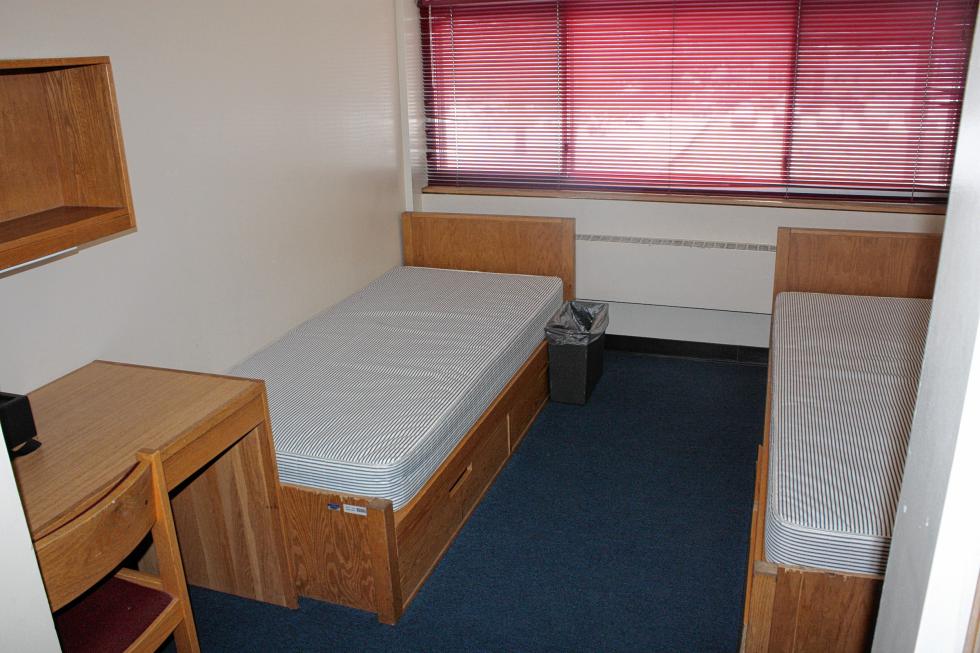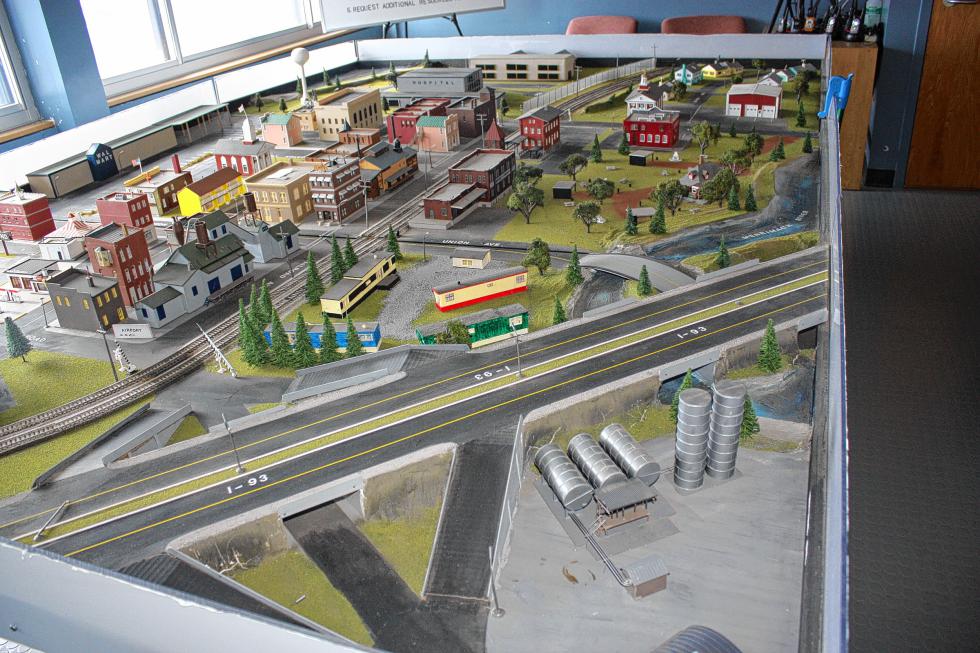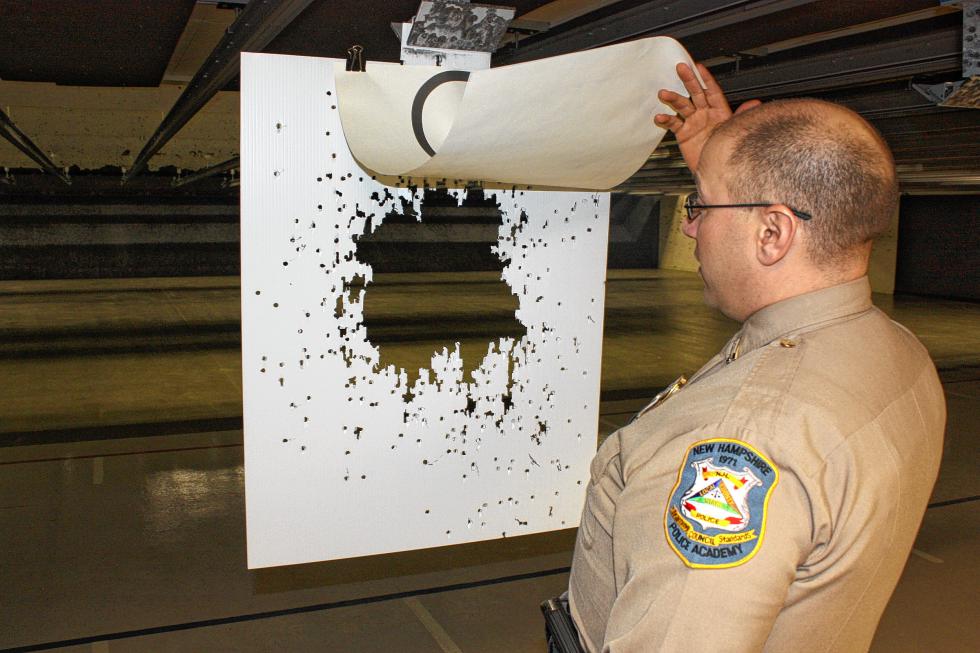New Hampshire has hundreds of police and corrections officers from Pittsburg to Pelham, and they all learn the ropes at the same place: the police academy right here in Concord.
Officially called the Arthur D. Kehas Criminal Justice Training Facility & Campus (which, for the sake of saving ink, we’ll refer to as the police academy from here on out), the sprawling complex right next to NHTI and the McAuliffe-Shepard Discovery Center is where the state sends all prospective police officers, known as recruits.
It’s a residential academy, which means all recruits who attend must live on the campus from Monday through Friday. And if you’re a recruit coming from the North Country or some other faraway corner of the state, that’s a good thing – days at the police academy begin at 5:30 a.m. and end at 9:30 p.m., and that goes on for 16 straight weeks.
Yikes.
In all, recruits will spend 684 hours training at the academy. And for some officers, that’s not even the end of the road. Many departments will have officers go through additional training based on each department’s specific needs and situations, said police Capt. Mark Bodanza, who oversees operations at the academy.
For instance, officers in some areas of the North Country will need to learn how to drive bigger, four-wheel-drive vehicles, while officers in Manchester or Nashua probably won’t need that training.
But all recruits, no matter where they intend to work, get the same foundational training that applies to all departments across the state. “It doesn’t matter if you’re a state trooper, if you’re a county sheriff or a deputy, or if you’re a municipal police officer – municipal encompasses all our cities and towns – you come to one police academy and you are trained here at one location,” Bodanza said.
How it works is when a police department decides to hire somebody, they send them to the academy to make sure they can hack it. But for some, the journey ends before ever reaching the academy.
Every potential recruit must undergo a background check, a polygraph test and a psychological evaluation, and then, if they’ve never been certified before, they have to take a fitness test – bench press, sit-ups, push-ups and a mile-and-a-half run.
In other words, we Insiders probably wouldn’t stand a chance (at the physical part, that is).
Sessions are 16 weeks at a time, and there’s usually about 60 recruits per session. Right now, Bodanza said there are 51 recruits going through training – although there were 55 in the beginning six weeks ago.
It’s not uncommon to lose a few recruits over the course of the 16 weeks, Bodanza said.
“In the first week, it’s traditionally, ‘You know what, this isn’t what I expected, this is not what I thought,’ ” Bodanza said. And often, that’s not referring to the physical demands of training to be a police officer.
“Some, you know, they get here and they’re away from family for the first time and they realize that, you know what, I just can’t bear being 16 weeks in this place and not be with family,” he said. “Some families can’t handle that on the outside.”
On the other hand, sometimes people just don’t meet expectations and requirements.
“Some academically – some, as hard as they try, they’re not academically doing well and they flunk out, so to speak,” he said.
Once a recruit leaves training, for whatever reason, that doesn’t necessarily mean that their chances of ever becoming a police officer are nil.
“They can re-apply if their agency sends them,” Bodanza said. This applies to those who leave training due to physical reasons. Those who “fail out” have a different process to go through if they want another shot.
Failed-out recruits who want to try again must go before the 14-member council that oversees all the training. That council is made up of all kinds of people – ordinary citizens, sheriffs, city police chiefs, town police chiefs, judges, community college representatives, state police officers, the attorney general.
All recruits must maintain a 70 percent average academically to remain in the academy. Coming in below that 70 percent threshold three weeks in a row can trigger a fail.
Those who don’t fail will graduate and then go out with a field training officer at their own department. The amount of field training time depends on the department, but once that’s done, the recruit’s journey to the police force is done.
So that’s basically the process from start to finish, but we skipped over all the stuff that recruits actually do during training. Don’t worry though, that’s up next.
The training
The first thing recruits go over is rules and regulations. This involves a lot of stuff on computers and iPads. Then they’ll learn about ceremony – things like marching, proper etiquette, proper form.
This stuff may sound a little boring to you, but it’s valuable, important stuff that must be learned before getting into shooting and driving and all that action movie cool stuff.
Once the basics are down, recruits learn about criminal law, motor vehicle law and constitutional issues. Those are taught in terms of the case law side and the practical side.
The fun stuff you want to hear about – shooting and driving – begins around Week 5, meaning this current crop of recruits just went through this part.
Recruits learn to operate multiple vehicles – Ford Crown Victorias, Dodge Chargers, Chevy Impalas and some SUVs. These vehicles represent the majority of police vehicles used in the state, so recruits can get familiar with any of the vehicles they’re likely to drive on the job.
It’s important for recruits to get experience in all of these vehicles, as they all handle very differently. Some have front-wheel drive, some have rear-wheel drive and some have four- or all-wheel drive, which all behave differently in different situations.
The one common thread is that all police vehicles have automatic transmissions, so officers don’t have to worry about trying to rev-match and downshift while chasing a suspect at 85 mph and talking to dispatch on the radio.
And as mentioned earlier, some departments will offer additional training of their own for special vehicles – motorcycles and all-terrain vehicles for the most part. These vehicles aren’t standard for every department, so there’s no need to train every future officer on them.
Week 7 will cover domestic violence, stalking, lethality assessment and ancillary classes related to those topics. Then it’s on to defensive tactics.
Recruits will go through about 60 hours of scenario-based tactics. “The goal is to tell, show and have them do it,” Bodanza said. The academy wants recruits to go through quite a few scenarios – after all, you can never really be prepared for everything, but you can certainly try going through all of the most likely scenarios.
And all of this training is jam-packed into every day. Mondays start a little later than the rest of the days, since recruits often head home for the weekend. Classes run from 8:15 to 12:15, then it’s time for chow. At 1:15, the second block of the day begins and runs until 5:15. The remainder of the night is usually consumed with nighttime driving principles and/or tests.
Tuesday through Friday, the days start at 5:30 with physical training for an hour.
If all of this sounds pretty intense, it’s because it is. These recruits really have to commit to this.
“Once you’re here, you’re here,” Bodanza said. By that he means there’s no running to the convenience store to grab a bag of chips, no heading out to the movies. There’s also no recreation provided. The last thing anyone wants is for a recruit to bust an ankle 12 weeks into training and pretty much have to start all over. (After all, it doesn’t cost the recruit anything, but each department is paying their recruits’ salary while at the academy.)
After learning all of this, you can probably understand why not everybody makes it through the rigors of training.
In retrospect, though, it’s probably for the best. Police officers are tasked with so much – and a lot of what they do is very dangerous – so it makes sense that they have to go through a lot of demanding training.
Maybe in a future life you’ll see us enroll for the sake of an issue. Don’t count on it, though.














